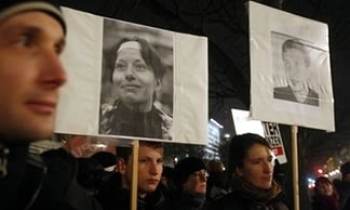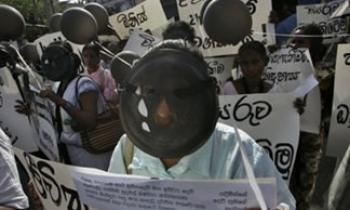Political influence is threatening France's media freedom: courageous journalists are harassed and prosecuted, while insubordinate chief editors are fired.
He strokes her chin and she looks deeply into his eyes. Both smile and beam. The latest photo-story, covering French interior minister Nicolas Sarkozy's Father's Day outing with his wife Cécilia, in the glossy magazine Paris Match, shows a seemingly happy couple. The accompanying text praises the display of "feeling during the rendezvous." This harmony is almost too good not to have been staged. And in reality this schmaltzy article about France's dream family is not one of the usual photo-stories about the private life of the serving conservative interior minister and promising presidential candidate. The gushing piece is more like an illustrated rebuttal.
About a year ago the same publication landed a real scoop -- on its front page of August 25 it showed Sarkozy's wife Cécilia on a New York visit with her then boyfriend, the advertising executive Richard Attias. The sensation brought Paris Match record sales of 900,000 copies.
The cuckolded minister was not amused and Sarkozy went straight on the offensive. Sure, the famous couple's marital discord had long been discussed by gossip columnists; But after the Paris Match photos made him a target of ridicule, Sarkozy -- according to satirical political magazine Le Canard enchaîné -- demanded that his friend Arnaud Lagardère dismiss Paris Match's editor-in-chief.
Lagardère, the boss of a business conglomerate, who is also Paris Match's owner, first of all expressed his apologies. It was clear that the exclusive story had also taken him completely by surprise. Yet, Sarkozy's friend did not want to fire his editorial director Alain Genestar on the spot. The incriminating photograph had, after all, been taken with the knowledge of the two sweethearts and was even published with their consent.
However, in the end the media company did get rid of the provoker of Sarkozy's rage: Genestar, editor-in-chief since 1999, cleared his desk -- the journalist had already turned down a sideways promotion. "Revenge is a dish best served cold" commented the Nouvel Observateur magazine.
Similar cases have since become the order of the day in France: politicians bullying broadcasters and publishers. Brave investigative journalists get collared by the law and become "demoralized or muzzled" by long-winded and expensive legal cases, according to the writer Ghislaine Ottenheimer -- from her own bitter experience.
It is now much easier for editors to fall victim to political pressures because so many newspapers are fighting for survival: France Soir, once a leading national tabloid paper, now has only 35,000 readers even after its latest relaunch. After losses in the tens of millions, left-wing Libération, with a circulation of just 76,000, had to let go its chief editor and founder Serge July, at the request of its main shareholder Edouard de Rothschild.
Even the Communist Party's main party organ Humanité is constantly in the red with a circulation of 50,000. And famous publications Le Monde and Le Figaro are under huge pressure from free city newssheets and news web sites.
This financial distress is threatening journalistic pluralism, claims the journalist trade union SNJ-CGT. Under the current conservative government reporters have increasingly been used as scapegoats. This was demonstrated, for example, in the case of Prime Minister Dominique de Villepin, when the politician, who is facing criticism from within his own party, sued four journalists the week before last for the "defamation of a government member."
De Villepin, who likes to point out that "politics requires courage", is targeting an editor at Novel Observateur because of his account of the unsavoury Clearstream affair, which the author cleverly named a 'Plot of the Paranoid.'
Before that the prime minister took legal steps against the reporter Denis Robert, whose investigation first broke the scandal over the alleged illegal accounts of French politicians.
Also being sued are a pair of writers who recently published a less than flattering account of the brutal use of power in the upper echelons of the state -- 'Showdown at the Elysée.' And this power is being used above all against independent journalists like the ousted Paris Match editor, Genestar.
"Currently there is a tendency to limit press freedom in favour of the rights of personalities," the top journalist mused, almost prophetically, last fall: "We need more transparency, we have to illuminate the dark zones and write the truth."









